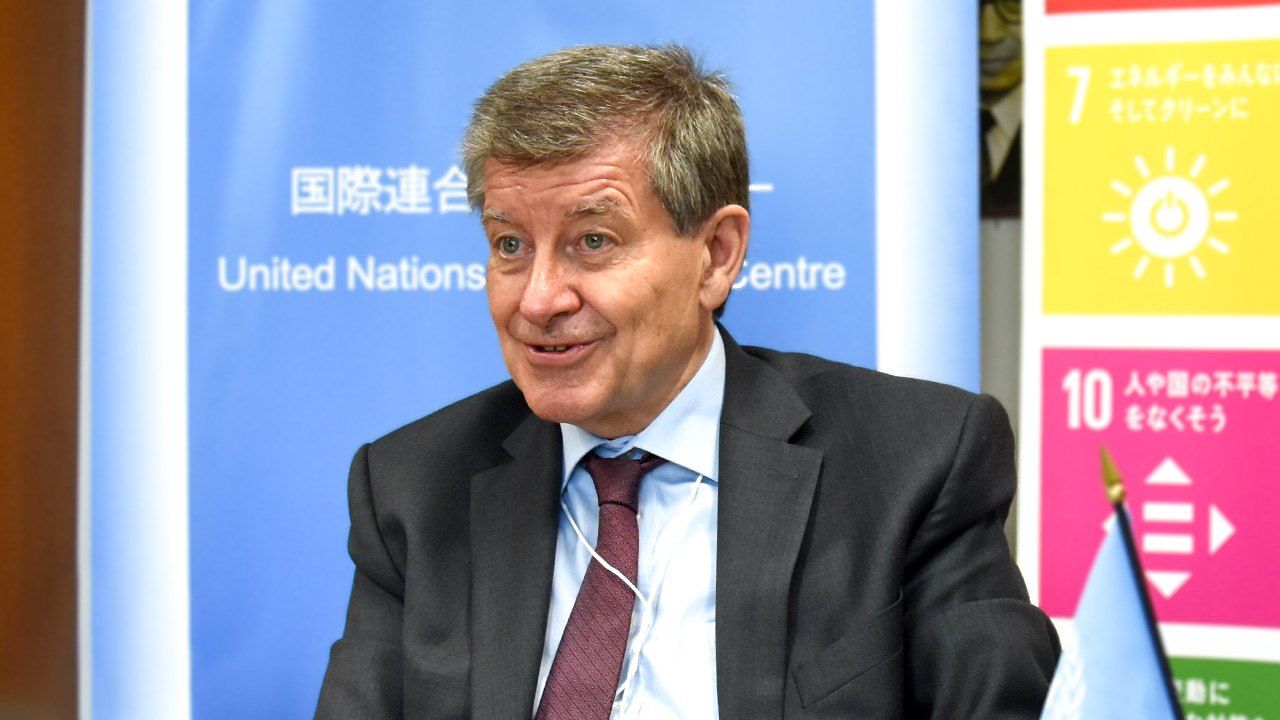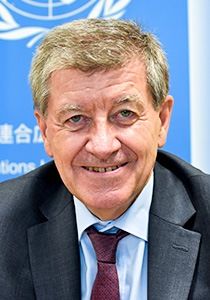
The Promise of Multilateralism: UN Takes on the Issues of Today and Tomorrow
Politics World People- English
- 日本語
- 简体字
- 繁體字
- Français
- Español
- العربية
- Русский
Multilateralism Challenged
INTERVIEWER The first, and most urgent, issue I’d like to ask about is the war in Ukraine. The secretary-general has said that there is not yet an opportunity for serious peace negotiations between Russia and Ukraine. The West was united at the Group of Seven summit in Hiroshima, but people still wonder when and how the war will end, and what role the United Nations has to play.
GUY RYDER The honest answer is that we don’t know how or when it will end. The invasion of Ukraine by Russia was a clear violation of international law and the UN Charter. The secretary-general has been to both Moscow and Kyiv, talking to the leaders, but does not see the conditions or space available for peace negotiations now.
This doesn’t mean that the United Nations hasn’t been active. While there are many conflicts in the world, one thing that distinguishes the conflict in Ukraine are its global, secondary effects—on food, on fuel and energy supplies, and with respect to finance. Many countries in the global South find themselves in difficulties in these three areas. The secretary-general and the UN are trying hard to address these secondary things. Take the Black Sea Initiative, which the UN has brokered with Turkey, Russia, and Ukraine to ensure that food and fertilizer exports continue. This is difficult work. The agreement has just been renewed for two months, and the UN continues to work for its extension. But this has been an important intervention by the UN.
There are two other areas where the UN has been active, with less visibility. One is nuclear security at the Zaporizhzhia nuclear power plant, in cooperation with the International Atomic Energy Association. And the other area is humanitarian work, including exchanges of prisoners of war. So while there hasn’t been a direct role in peace negotiations, and the future remains uncertain, the UN has been very active in these areas.
INTERVIEWER You’re now preparing for the Summit of the Future in 2024. If the war drags on, how will this impact the environment for the grand agreement to be reached on our future?
RYDER The multilateral space, in New York and elsewhere, is challenged by tensions including those generated by the war in Ukraine. Whatever the circumstances, though, it’s the work of the UN to move forward in a determined way to prepare for the summit.
The Summit of the Future offers opportunities to do a number of things: to strengthen multilateralism, to make it more effective and networked, and to make it better equipped to meet the numerous, serious challenges of the future. We hope the summit will result in a commitment from member states to a Pact for the Future. The summit is the culmination of the Our Common Agenda process—something the UN positions as a “turbocharger” for action toward the Sustainable Development Goals. Now these are complementary, not competing, agendas: Investing in the Summit of the Future in no way detracts from the SDG summit, which is taking place in September this year. Indeed, the secretary-general has said repeatedly that the key event this year in the multilateral arena is the SDG summit, whose success will build a path to a successful Summit of the Future.
It’s overstating things to say that this summit and the Pact for the Future are the successor to the SDGs. The summit complements the 2030 Agenda and is intended to accelerate delivery of the SDGs.
Is Sustainability Off Track?
INTERVIEWER The secretary-general has said that we’re far off track in achieving the SDGs. Here in Japan, though, they have very high visibility—at schools, in enterprises and government offices, everywhere. Japan seems to be doing a good job in this respect.
RYDER This points to a certain divergence around the world. Awareness and buy-in for the SDGs is very impressive. Surveys show awareness of 92 percent in Japan for the SDGs, which is tremendous.
What is disappointing is that we’re off track in delivering on the goals. The latest reports published ahead of the SDG summit talk about just 12 percent of the indicators being on track now. It’s tempting to say, well, there was a pandemic, and now the war in Ukraine, but we shouldn’t use these two shocks as an all-purpose excuse. The SDG summit in September is designed very consciously as a “rescue operation” for the SDGs, helping us recommit to and accelerate the process. We have to move the needle on these. Because awareness is so high, in Japan and elsewhere, I believe this will meet with public approval.
INTERVIEWER Today we’re seeing a number of new issues emerge—for example, the use of generative AI. Is the Summit of the Future, or the UN itself, going to address the potential negative effects of this new technology?
RYDER Yes. We’re seeing new information on AI come out every day, and even experts in the field are expressing concerns about it. Of course, AI has extraordinary positive potential for society, but there are worries that accompany the opportunities.
One of the themes of the Summit of the Future’s agenda is new technologies—not just AI, but the broader impacts of digital technology, as well as areas like biotechnology and genetic engineering. The Summit of the Future will attempt to adopt what we call a Global Digital Compact. Its principles include things like bridging the digital divide, increasing connectivity around the world, ensuring safe access to a unified internet, and a great deal more.
There’s a proposal to implement the pact in a way that brings together the various, fragmented pieces of technology governance. And of course a part of this will involve tackling the concerns relating to AI.
INTERVIEWER Aside from these newly emerging issues, we face the most important one: climate change. Here, too, the secretary-general has warned that we’re off track in achieving the goals of the Paris Agreement.
RYDER Indeed, as he’s said in many arenas, climate change is advancing more quickly than our willingness to control it. The key arena here is the COP meetings, with another one coming toward the end of this year. Climate change stands as one of the biggest areas of deficit in our pursuit of the SDGs—not just because we’re so far behind, but because the consequences of failure to act are so severe.
One step forward was the introduction of “loss and damage” funding at COP27 last year in Sharm el-Sheikh, Egypt. We have to reach a stronger understanding between the global North and South on the financial, technological, and political responsibilities of the various actors. We need a common purpose in our international approach to climate action. This is an existential threat.
Japan’s Expectations of the United Nations
INTERVIEWER In Japan, as you know, people’s interest has always been strong in the United Nations. A Pew Research Center poll, though, shows that favorability has been low in Japan for several decades now—just around 40 percent or so, compared to much higher figures in other countries, even the United States.
RYDER These figures are surprising to me, too, and are a matter of concern. It makes me wonder about how the media present the UN in Japan. In the long run, though, multilateralism will be judged on the basis of the results it achieves. I think the Japanese people are receptive to and approving of international cooperation—the idea that we should be addressing common problems of all people by working together.
Of course, it’s natural to look at the effort, resources, and political capital that go into the process. If there’s no return, people ask themselves whether it’s worth it. Therefore, the answer has to be to make multilateralism more effective.
This takes us back to the Summit of the Future, with its target of making multilateralism work better. I hope the agenda there can lead to Japanese approval ratings of the UN increasing once again.
People’s expectations are rightfully high. But there’s a reality to bear in mind: What the UN can achieve depends in the last instance on the commitment and the will of the member states. And sometimes that isn’t there.
That said, I think we have an obligation to be optimistic—cautiously so, of course. We have to be determined to make the Summit of the Future a success. The role of the people I’m working with in the secretariat is to present to member states reasons why making progress in the various areas of the summit agenda is in the interest of their peoples.
(Originally written in English based on a June 2, 2023, interview at the United Nations University Headquarters in Shibuya, Tokyo. Interviewer Akasaka Kiyotaka is representative director of the Nippon Communications Foundation. All photos © Nippon.com.)
Related Tags
United Nations Ukraine sustainability artificial intelligence SDGs



